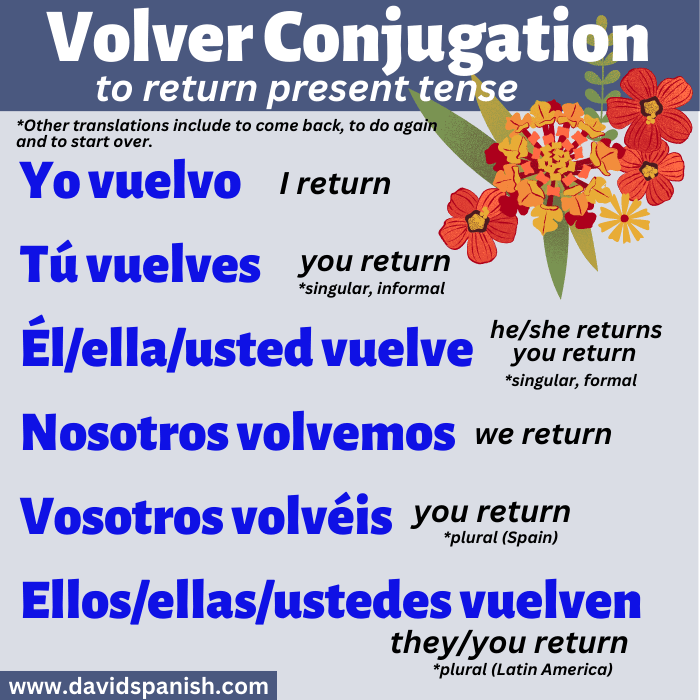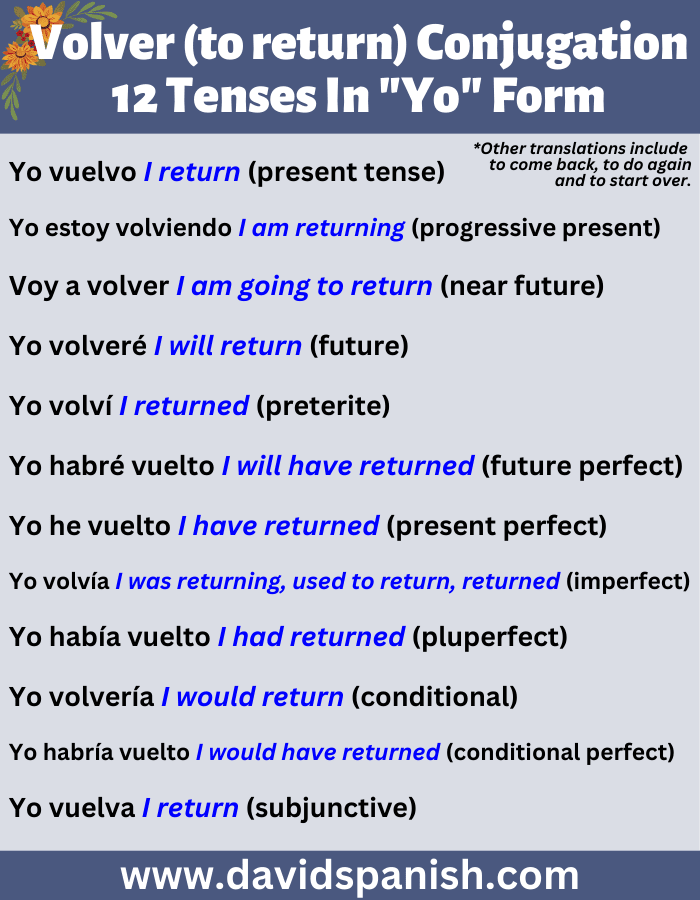The Spanish verb volver means to return, come back and do again. The conjugation of volver in the present tense is: Yo vuelvo (I return), tú vuelves (you return), él/ella/usted vuelve (he/she returns, you return) nosotros volvemos (we return), vosotros volvéis (you return) and ellos/ellas/ustedes vuelven (they/you return).

Volver is an irregular ER verb. This is because while its endings are the same as all other regular ER verbs in when conjugated in the present tense, its stem changes.
This page on our site covers regular and irregular Spanish ER verbs in detail. This page covers conjugations for comer (to eat), an example of a regular ER verb.
The verb devolver means return or give back an item or object and follows the same conjugation patterns as volver.
Volver conjugated in the present tense

Further down the page you’ll find complete conjugation charts for volver with example sentences for the following commonly used Spanish verb tenses:
- Present tense (presente de indicativo)
- Progressive present (presente progresivo)
- Near future (futuro inmediato)
- Future tense (futuro)
- Preterite (pretérito)
- Present perfect indicative (perfecto de indicativo)
- Imperfect (imperfecto de indicativo)
- Conditional (potential simple)
- Present subjunctive (presente de subjuntivo)
- Imperative (imperativo)
Volver conjugation table

The following graphic shows conjugations for volver for the first-person singular (yo) in twelve verb tenses.

Volver uses
The verb volver is very versatile and has many uses. Understanding the various uses of volover will come in handy when reading through the example sentences in the the conjugation charts below.
To come back, to return
A common use of volver is to mean to come back and to return. When specifying a place, the prepositon de (from) follow the conjugated form of volver.For example:
- Vuelvo a casa a las seis de la tarde. I come home at 6pm.
- Cuándo vuelves de Colombia? When are you coming back from (or returning from) Colombia?
To do something again, to start over
The construction volver + preposition a + infinitive means to do something again or to start again. For example:
- Vuelvo a tocar la guitara. I start playing the guitar again.
- Vuelves a estudiar los verbos. You start studying the verbs again.
To get back to
The construction volver + noun means “to get back to”. For example:
- Tras una semana, vuelvo a mis ejercicios. After a week, I get back to my exercises.
- Volvamos al tema. Let’s get back on topic.
To drive, to make
Volver can also be used to mean “to drive” or “to make”.
- ¡Me vuelves loco! You drive me crazy!
Volver conjugation charts
Present tense (presente de indicativo)
In the present tense, yo vuelvo transaltes to “I return” and “I am returning”.
| yo vuelvo | I return (or come back, do again) | Vuelvo a casa muy tarde. | I come home very late. |
| tú vuelves | you return | ¿Cuándo vuelves de Londres? | When are you coming back from London. |
| él/ella, usted vuelve | he/she returns, you return | Vuelve a estudiar español. | He starts studying Spanish again. |
| nosotros volvemos | we return | Volvemos de la tienda con ropa nueva. | We come back from the store with new clothes. |
| vosotros volvéis | you return | Volvéis de la playa con vuestros amigos. | You come back from the beach with your friends. |
| ellos/ellas, ustedes vuelven | they/you return | Esta noche no vuelven a casa. | They're not coming home tonight. |
Progressive present (presente progresivo)
The progressive present combines the present tense of estar (to be) with the present participle. Yo estoy volviendo translates to “I am returning”.
| yo estoy volviendo | I am returning (or doing again) | Estoy volviendo de la oficina. | I'm coming back from the office. |
| tú estás volviendo | you are returning | Estás volviendo de España. | You're coming back from Spain. |
| él/ella, usted está volviendo | he/she/you is (are) returning | Ella está volviendo de la casa de su novio. | She's coming back from her boyfriend's house. |
| nosotros estamos volviendo | we are returning | Estamos volviendo del entro de esquí. | We're coming back from the ski resort. |
| vosotros estáis volviendo | you are returning | Estáis volviendo de Mallorca. | You're coming back from Mallorca. |
| ellos/ellas, ustedes están volviendo | they/you are returning | Están volviendo de la peninsula de Yucatán | They're coming back form the Yucatan peninsula. |
Near future (futuro inmediato)
The near future tense is formed by combining the present tenser of ir (to go) with the preposition a and an infinitive. Yo voy a volver translates to “I am going to return” or “I am going to start again”.
| yo voy a volver | I'm going to return (or start again) | Voy a volver a casa en una hora. | I'm going to come home in one hour. |
| tú vas a volver | you're going to return | ¿Vas a volver a casa esta noche? | Are you coming home tonight? |
| él/ella, usted va a volver | he/she is (you are) going to return | Va a volver a Mexico en noviembre. | He's going to return to Mexico in November. |
| nosotros vamos a volver | we are going to return | Vamos a volver con su regalo. | We're going to return with your gift. |
| vosotros vais a volver | you are going to return | ¿Cuándo vais a volver a verme? | When are you going to come back to see me? |
| ellos/ellos, ustedes van a volver | they/you are going to return | Nunca van a volver a ese restaurante. | They'll never go back to that restaurant. |
Future tense (futuro)
In the future tense, yo volveré translates to “I will return” or “I will start again”.
| yo volveré | I will return (or start again) | Volveré a estudiar los verbos mañana. | I'll start learning the verbs again tomorrow. |
| tú volverás | you will return | Volverás con tus amigos? | Will you come back with your friends? |
| él/ella, usted volverá | he/she/you will return | Volverá a hacer los ejercicios en el verano. | He'll start doing exercises again in the summer. |
| nosotros volveremos | we will return | Volveremos de Paris en una semana. | We'll come back from Paris in one week. |
| vosotros volveréis | you will return | ¿Cuándo volveréis de Mardrid? | When will you come back from Madrid? |
| ellos/ellas, ustedes volverían | they/you will return | Volverían a casa muy tarde. | They'll get home very late. |
Preterite (pretérito)
The preterite tense is used to express past actions which occurred at specific times. Yo volví translates to “I returned” or “I started again”.
| yo volví | I returned (or started again) | Volví a cantar las canciones rancheras. | I started singing ranchero songs again. |
| tú volviste | you returned | ¿Cuándo volviste a casa? | When did you get home? |
| él/ella, usted volvió | he/she/you returned | ¿Por qué no volvió? | Why didn't he return? |
| nosotros volvimos | we returned | ¡Volvimos con un cachorro! | We came back with a puppy. |
| vosotros volvisteis | you returned | ¿Cuándo volviste de España? | When did you come back from Spain? |
| ellos/ellas, ustedes volvieron | they/you returned | Volvieron de los Estados Unidos anoche. | They came back from the United States yesterday night. |
Present perfect indicative (perfecto de indicativo)
The present perfect is used to express past actions which have a bearing on the present. Yo he vuelto translates to “I have returned” or “I have started again”.
| yo he vuelto | I have returned (or started again) | Todavía no he vuelto. | I still haven't returned? |
| tú has vuelto | you have returned | ¿Has vuelto en tu país? | Have you returned to your country? |
| él/ella, usted ha vuelto | he/she/you has (have) returned | Ha vuelto a tocar la guitara de nuevo. | He has started playing the guitar again. |
| nosotros hemos vuelto | we have returned | Hemos vuelto de la estación de tren. | We've returned from the train station. |
| vosotros habéis vuelto | you have returned | Habéis vuelto de la boda de vuestro hermano. | You've returned from your brother's wedding. |
| ellos/ellas, ustedes han vuelto | they/you have returened | Han vuelto del aeropuerto. | They have returned from the airport. |
Imperfect (imperfecto de indicativo)
The imperfect tense is used to express past actions which occurred at unspecified times. Yo volvía translates to “I was returning” and “I used to return”.
| yo volvía | I was coming back (or used to come back, start again) | Cuando era joven, volvía a casa muy tarde. | When I was young I used to come home very late. |
| tú volvías | you were coming back | Volvías a casa cuando Pedro llamó. | You were returning home when Pedro called. |
| él/ella, usted volvía | he/she/you was (were) coming back | Volvía del aeropuerto cuando me llamaste. | You were coming back from the airport when you called me. |
| nosotros volvíamos | we were coming back | Volvíamos de la fiesta cuando nos encontramos María. | We were coming back from the party when we bumped into Maria. |
| vosotros volvíais | you were coming back | ¿Por qué volvíais a casa tan tarde? | Why did you used to come home so late? |
| ellos/ellas, ustedes volvían | they/you were coming back | Nunca volvían antes los niños. | They used to never come back before the kids. |
Conditional (potential simple)
The conditional tense is used to describe hypothetical actions. Yo volvería translates to “I would return” or “I would do again”.
| yo volvería | I would return (or do again) | Volvería en México si fuera posible. | I'd return to Mexico if it were possible. |
| tú volverías | you would return | ¿Volverías en tu país si tuvieras más dinero? | Would you return to your county if you had more money? |
| él/ella, usted volvería | he/she/you would return | Volvería su ex si fuera posible. | He'd get back together with his ex if it were possible. |
| nosotros volveríamos | we would return | Volveríamos a estudiar los verbos si tuviéramos más tiempo. | We'd start studying verbs again if we had more time. |
| vosotros volveríais | you would return | ¿Volveríais en vuestra zona si fuera más segura? | Would you return to your region if it were safer? |
| ellos/ellas, ustedes volverían | they/you would do again | Volverían a vaijar si tuvieran más tiempo libro. | They'd start traveling again if they had more free time. |
Present subjunctive (presente de subjuntivo)
The subjunctive mood is used to express wishes, emotions and doubts. Yo vuelva translates to “I return” or “I start again”.
| yo vuelva | I return (or start again) | Quiere que vuelva a estudiar los verbos. | He wants me to start learning the verbs again. |
| tú vuelvas | you return | ¿Es verdad que vuelvas en España? | Is it true that you're going back to Spain? |
| él/ella, usted vuelva | he/she returns, you return | Es dudoso que vuelva a vernos. | It's doubtful he'll see us again. |
| nosotros volvamos | we return | Es importante que volvamos en México. | It's important that we go back to Mexico. |
| vosotros volváis | you return | No peinso que volváis a casa. | I don' think you're coming home. |
| ellos/ellas, ustedes vuelvan | you/they return | Quiero que vuelvan a tocar la música. | I want you to start playing music again. |
Imperative (imperativo)
The imperative mood is used to express commands and suggestions. Example sentences are under the chart.
| (tú) ¡vuelve! | Come back! (or return, start again!) | ¡no vuelvas! | Don't come back! |
| (usted) ¡vuelva! | Come back! | ¡no vuelva! | Don't come back! |
| (nosotros) ¡volvamos! | Let's come back! | ¡no volvamos! | Let's not come back! |
| (vosotros) ¡volved! | Come back! | ¡no volváis! | Don't come back! |
| (ustedes) ¡vuelvan! | Come back! | ¡no vuelvan! | Don't come back! |
- ¡Vuelvan mañana! Come back tomorrow!
- ¡No vuelve a hacerlo! Don’t do it again!
- ¡Volvamos en Europa! Let’s go back to Europe!
- ¡No vuelvas a mi casa! Don’t come back to my house!
Discover more:
- Conocer (to know a person or place) conjugation charts
- Saber (to now something factual) conjugation charts
- Comer (to eat) conjugation charts
- Decir (to say, to tell) conjugation charts
- La Bamba Meaning, Spanish Lyrics & English Translation - May 4, 2024
- Bésame Mucho Meaning, Spanish Lyrics & English Translation - May 3, 2024
- Querida – Lyrics, Meaning & Translation - May 2, 2024
